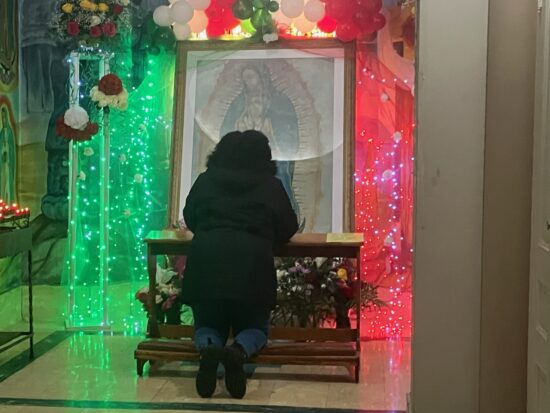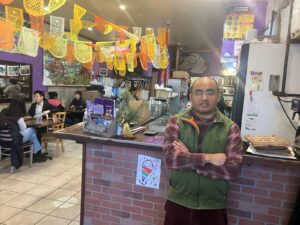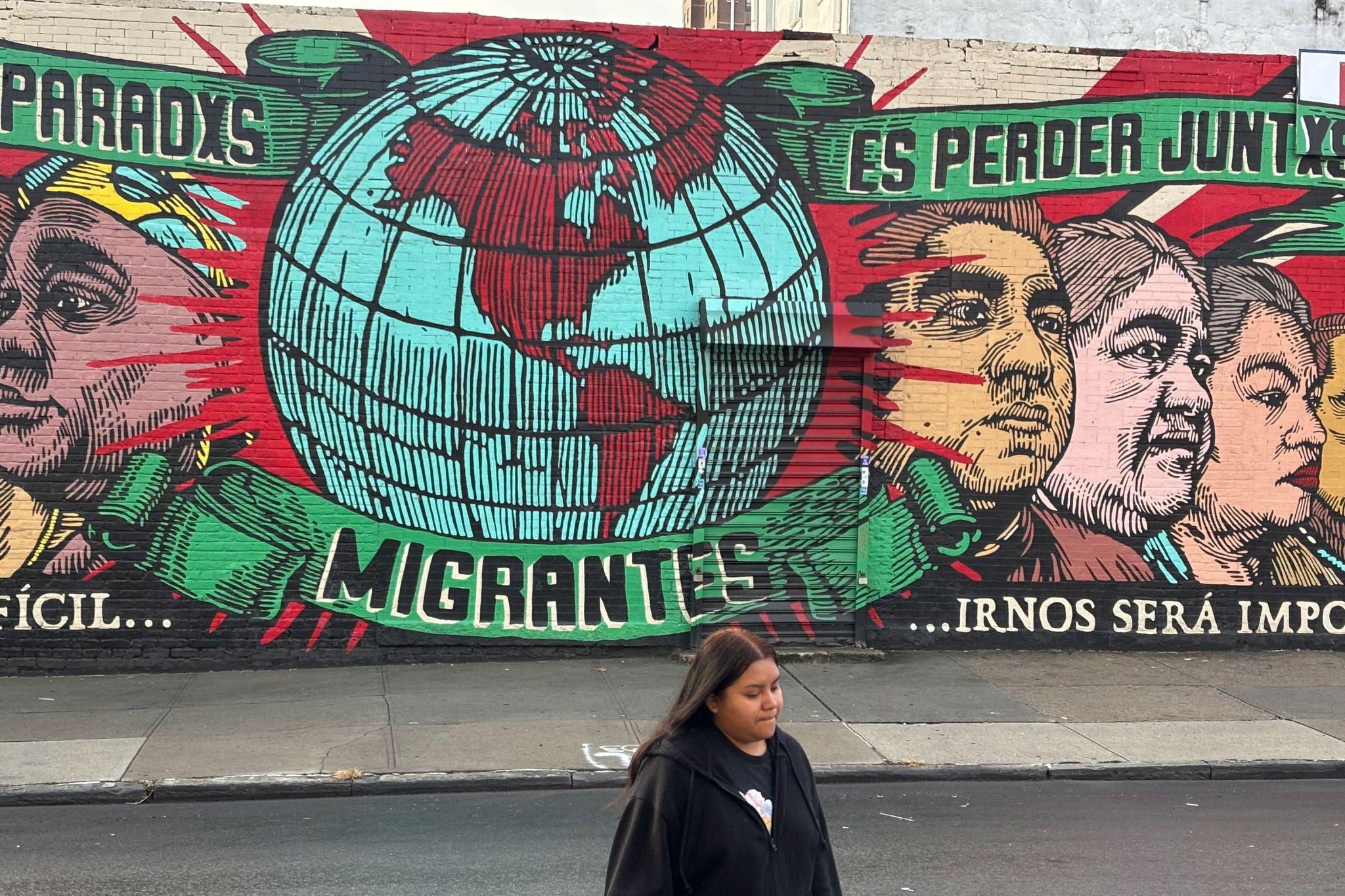Kabir Ahmed sat behind a foldable desk at Darou Salam, a mosque and Islamic school in Melrose, helping two newly arrived immigrants from West Africa get work authorizations. Meanwhile, a group of men gathered on the carpet, organizing a stack of letters to send to employers. Many of them live in shelters with their families, and these letters hold some hope for establishing themselves in the city.
“They need help, that is why we are here,” said Ahmed.
Men, women, and families travel from every corner of the city to pray and access services at the mosque on Elton Avenue.
At Darou Salam they find more than spiritual sustenance: Ade Oparinde, the mosque secretary, Ahmed, and his team connect migrants to legal services, employment opportunities, ESL classes, and citizenship test study guides. The majority of migrants arriving from West Africa apply for asylum, Ahmed said.

Since the election, the men who come to pray have been chattering, worrying what will happen if Donald Trump’s promised deportation drives occur. Oparinde hopes to allay their fears.
“It’s not going to happen overnight. You know it, America takes a process,” said Oparinde, who immigrated from Nigeria over thirty years ago. “Here we try to educate them. They bring their fears, but with the experience of people who have been here for a long time, they let them know how things work here.”
Darou Salam is one of many grassroots organizations across the South Bronx trying to both calm their members and prepare for the worst.
In a speech to Republicans in Chicago on December 9th, incoming President Donald Trump’s “border tsar” and former ICE official Tom Homan told Democrats to “get the hell out of the way” of sweeping Republican plans to deport migrants, including the children of non-citizens born in the US.
“We have a long four years ahead of us,” said Becky Smith, a social worker at Bronx Legal Services. She is also a member of the steering committee at Bronx Immigration Partnership, a coalition of over 25 community-based organizations. But she added that the groups she works with are trying not to be alarmist.
“There’s already a lot of fear in the community, and there’s already a lot of panic that’s spreading about what might happen,” said Smith.
Immigrants make up 35% of the Bronx population. According to Pew Research, 2023 saw the number of foreign-born people in the US grow by 1.6 million – the highest one-year increase since 2000. As of 2019, more than half (54%) of the undocumented immigrants in the Bronx had been in the US for over ten years – long enough to establish families, grow communities, and integrate into the economy.
“You don’t need Trump to come in and implement these mass deportations because he’s already instilled that fear… we hear about people talking about self-deportation,” she said.
Although each of the organizations in the Bronx Immigration Partnership is funded differently, there are also concerns that federal funding for the state of New York may be cut due to its high numbers of residents eligible for public services through PRUCOL status.
“I think we’re very worried about what the Trump administration is going to do in terms of trying to defund different programs that will impact us,” Smith said, adding advocacy groups will provide information clinics to protect the people they serve from scammers taking advantage of the heightened fears.
One of the Bronx Immigration Partnership member organizations, the Mexican American Students Alliance, has been serving Spanish speakers in Mott Haven since 2001, offering educational and afterschool programs, as well as parental support and free legal services.
MASA’s executive director Aracelis Lucero was raised in Hunts Point after her parents immigrated from Puebla, Mexico in the early ‘80s, among the first Mexicans in the neighborhood. Now the organization sees increasing numbers of people from Peru, Ecuador, Venezuela and Colombia—all fleeing civil unrest and authoritarian governments.
MASA served about 10,000 clients last year. She says immigrant support organizations suspected Donald Trump would be elected. But what surprised her is the inaction of city officials in response to Trump’s threats.
“I expected a much more public response to ensure that New York City is going to continue to be a sanctuary city,” said Lucero. “To do everything in their power to protect immigrants from federal agencies and not to use their funds to harm immigrant communities.”
MASA will partner with local public schools to disseminate information so people know their rights, she added. MASA staff will be assigned to support families facing deportation. That will be particularly important because there won’t be enough lawyers to meet the need for legal defense.
Alianza Americas, an organization dedicated to defending the rights of migrant communities in North and South America for 20 years, said Trump’s policies would be disastrous.
“Nobody will be safe under the Trump administration, including the five million children who live with an undocumented parent,” said Executive Director Dulce Guzmán. “Immigrant children and families are preparing for the worst. This draconian effort would cost taxpayers $315B, funds that could be better-spent funding initiatives that will improve the lives of all people in the U.S..”
The American Immigration Council estimates a mass deportation operation will cost taxpayers $88 billion every year.
Alianza Americas is preparing by combating anti-immigrant disinformation, and creating community safety plans. “We are preparing to mobilize our membership and other allies to elevate the vital role of immigrants in our communities,” said Guzmán.
Alongside the nonprofit groups, faith communities are on the front lines. Father Frank Skelly remembers the anxiety that hovered over his Melrose congregation at Immaculate Conception Roman Catholic Church. During the first Trump administration, parishioners established a phone chain to alert each other about raids, and photographed incursions by ICE agents, but didn’t obstruct officials.
With a second Trump administration looming, Skelly says similar measures will be needed to protect immigrants, documented or not. He addressed the anti-immigrant threats in his homily on the Feast of Our Lady of Guadalupe, December 12. El Dia de Guadalupe is enthusiastically observed in the Mexican American community and Guadalupe revered a protector – mother – of the Mexican people.

Skelly was incensed that Mayor Eric Adams had met with the new Border Tsar Homan earlier that day to discuss cooperation between the city and federal government to deport undocumented immigrants, ignoring the sanctity of Dia de Guadalupe for the Mexican community.
“Does the mayor not know what day this is?” he said.
But the mosaic of immigrants in the South Bronx is not limited to Latin Americans. Increasing numbers of West Africans have attended mass in recent years, he said.
“Trump has said he has the right to wait outside churches,” Skelly said. “We have people’s addresses on the computer. I will not give access to that.” He was recently found in contempt of court for refusing to provide the address of an immigrant parishioner involved in a car accident to the opposing lawyer.
But any notion of harboring undocumented immigrants in the church longterm is impractical, he said.
Jose Mateo, pastor at another Melrose church providing support for migrants, Centro Cristiano Camino Al Paraiso, said his church will continue to serve as a sanctuary for immigrants, and that it will not cooperate with “ICE or the police,” if they come knocking.
Roberto (a pseudonym), 38, moved to the Bronx five months ago. He saw the church’s open door from across East 159st on Courtland Avenue for weeks, until one day a member of the church invited him in.
“The big thing is having that sense of family in the church,” said Roberto, who washes dishes in Manhattan to send money back to Mexico for his four children. “I live day to day—go to work, go home, go to work, go home.”
Roberto said he worries about deportation, but hasn’t tapped into support services because he doesn’t know where to start.
Some groups with a more general mission say protecting their neighbors will become more important.
“It’s going to be an ‘all hands on deck’ approach,” said Anthony Jordan, district manager of Community Board 1, including bringing experienced immigration lawyers to teach people about their rights.
“This center will be a resource center. Even if you don’t have your status, we wanted to make sure you still know your rights,” said Jordan. “This community is a melting pot. People come here for their start.”
During the last Trump administration, he recalled, “people were fearful of the rumors of ICE. People couldn’t pay their bills because they were scared to go to the post office. It pushed people back underground.”
Jordan has witnessed increasing desperation in the neighborhood. Last winter some 20 African men aspiring to get work as Uber drivers slept in front of the Melrose Avenue building next to the community board office, waiting to obtain IDs at the state office.
Board 1 intends to use social media “as a platform for fact-finding and dispelling of misinformation.” Jordan echoed Smith’s concerns about scams and exploitation; services which appear to offer free information, but might financially exploit migrants or collaborate with ICE.
Rosa Cohen-Cruz, policy counsel and team leader of immigration services at The Bronx Defenders, is advocating for two bills that would limit cooperation with ICE among law enforcement and state government and employees.
Both bills will be introduced in the New York State Senate in January, she said. The New York for All Act, would prohibit city or state officials from disclosing the immigration status of people they come into contact with. The bill had 31 co-sponsors when introduced in the state senate last year, none of them Republicans, and failed to make it out of committee. In the Assembly, none of the bill’s 64 co-sponsors were Republicans. It was referred to the Ways and Means committee but not voted on by the full Assembly.
Establishing a clear separation between public entities and ICE is necessary, Cohen-Cruz said, “because many undocumented people fear that anything that’s sort of connected to the state will cause that information to be shared with ICE. No one is saying that New York State can completely ban ICE from doing their job here,” but, she said, the bill would disincentive law enforcement agencies from “doing ICE’s job for them.”
The second bill, the “Dignity Not Detention Act”, would terminate contracts between government entities and ICE, essentially prohibiting prisons and jails from acting as an overflow or extra capacity for immigration detention facilities. There are currently three active contracts between New York jails and ICE, which would also be terminated by the bill.

“We have a worst case scenario, but you can’t live in fear,” said Marco Saavedra while waiting tables at lunchtime at La Morada, the restaurant on Willis Avenue his family has run since 2009. The Saavedras have been outspoken supporters of Mott Haven’s immigrant community.
“Every administration has preyed on immigrants,” including the Obama administration, under which deportations were common, he said. In the face of Trump’s policies, Saavedra is putting his faith in the wisdom and vigilance of the immigrant support community.
“The Bronx is so strong,” he said. “Our values, our community work is already there.”
With additional reporting by Joe Hirsch.

